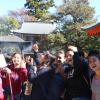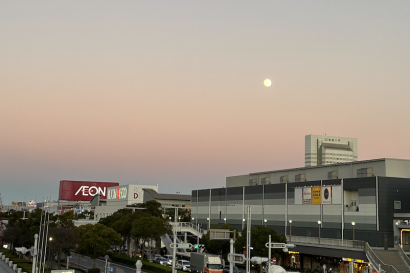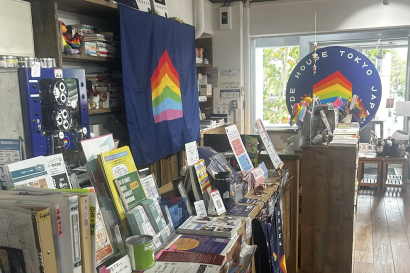A few weeks ago, I found myself standing at the edge of the Motoyasu River in Hiroshima, where I stood two summers ago on the eve of the 70th anniversary of the dropping of the A-bomb. I leaned against the railing, watching the sunset rays glimmer across the metal skeleton of the A-bomb dome, unable lift the heavy feeling trapped in my ribcage.
I guess it’s the finality that gets me. I can’t help but picture that day. I imagine the streets busy with people travelling around Hiroshima, on their way to another day of cleaning up demolition sites. Then, at 8:15am, some high school students squatted in the rubble to take a break. Some dusted soot off their uniforms. A few wiped sweat from their forehead, squinting in the bright light, just barely able to discern the distant figures of American planes flying overhead. I think of the charred tricycle entombed at the Hiroshima Peace Memorial Museum, and the young child who watched the city alight with flames.
The cognitive dissonance, for me, is overwhelming and deafening. There isn’t a crevasse in the city that I can hide in, because I feel the weight of my ancestor’s footprints trailing in the shadows behind me wherever I go. I am a fifth-generation Japanese-Filipino who has lived in Hawaii her entire life. How am I supposed to react to being in Hiroshima? As an American, I felt immensely guilty. The Hawaiian in me remembers Pearl Harbor. The Japanese part of me weeps.
I was born long after the war ended. Even my grandmother was not alive when the attack on Pearl Harbor shook the nation. Yet, she still tells stories of being bullied and ostracized in the immediate aftermath of the war. Her voice always hardens when she spits out the words, “Japs.” We sacrificed our own language, and the culture of our ancestors to assimilate into this society.
We are still waiting for the day we are truly accepted in this country.
In the immediate aftermath of the 2016 Presidential Election, I am forced to come to terms with ideologies that reject me. The “make America great again” slogan leaves me with no doubt that this new vision for America doesn’t include me, as a woman, as a minority. The flood of hate crimes against minorities have made me anxious about returning to the U.S. The thought that the color of my skin and the slant of my eyes will make me a target of abuse in my own country is terrifying. I am scared to be Asian in America.
This election has made me feel like everything my family has sacrificed is still not enough. I began to wonder what I should do in order to distance myself from my culture, in order to prove that I am American—as if that will protect me. But I have found that such bonds are not so easily severed. The Japanese traditions I carry out in my daily life are the threads that connect the generations, from ancestors to present-day descendants. It is impossible to extricate where my heritage begins and I end. It has taken me a long time to come to terms with that—and to understand that ancestry is not a burden for me to bear. I am proud to be Asian-American.
This is why I believe studying abroad is a vital experience. By taking the time to explore cultures different than my own, I can learn tolerance and acceptance, and how to reject the default of what I believe to be the one and only right way to live. I used to feel like I straddled the boundary between two worlds, but now I realize that I am a bridge between two cultures—a gateway for promoting understanding and acceptance. I am not weak because of my multifaceted ancestry—but stronger because of it.
Edited May 2017










